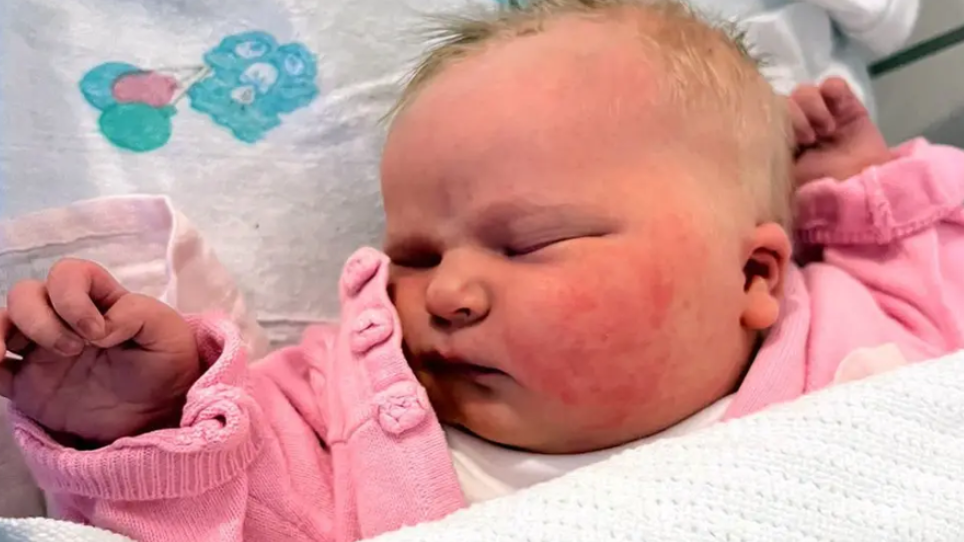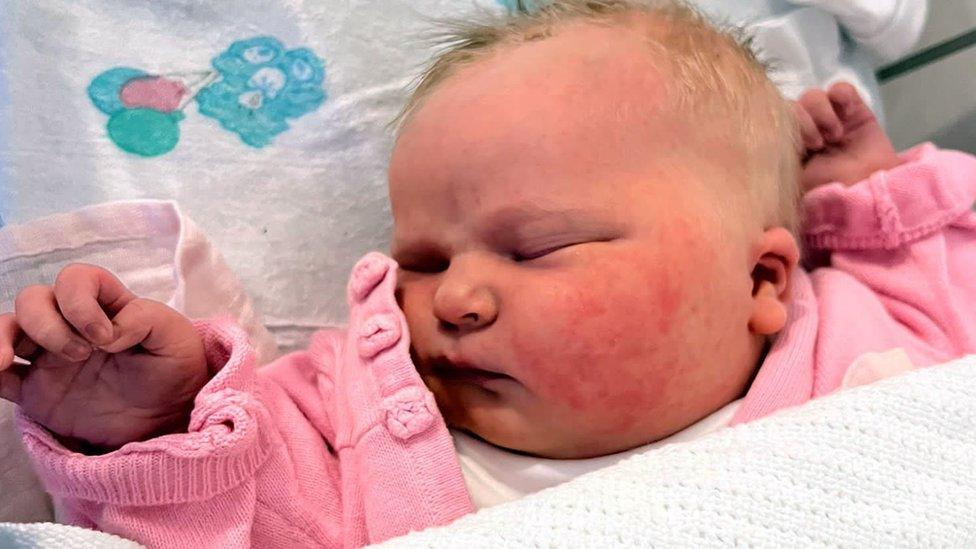Baby death not caused by 999 delay, inquest told

Wyllow-Raine Swinburn was pronounced dead five minutes after she reached hospital on 30 September
- Published
Ambulance delays did not contribute to the death of a newborn baby, despite her family having an "awful" wait on a 999 call, an inquest has heard.
Wyllow-Raine Swinburn fell ill on 30 September 2022 and died shortly after arriving at Oxford's John Radcliffe Hospital.
The inquest into her death heard her mother had spent eight minutes on an unanswered 999 call before waiting a further 30 minutes for an ambulance to arrive at their home in Didcot.
Coroner Darren Salter returned a narrative conclusion at Oxfordshire Coroner's Court.
The inquest heard Wyllow-Raine had been born via a caesarean section on 27 September. She weighed 10lbs 5oz and appeared to be healthy.
In evidence given previously, grandmother Anna Fisher said that three days later the infant was crying when she was taken to bed at the family home in Didcot, Oxfordshire.
Wyllow-Raine's mother Amelia Pill had phoned her in the early hours of 30 September 2022 to say the baby did not appear to be breathing, the hearing was told.
Her statement described how Ms Pill was "shouting down the phone and begging for someone to answer" as she waited on the phone after dialling 999.
Giving evidence, Karen Sillicorn-Aston, clinical governance lead for South Central Ambulance Service (SCAS), said the call was made at 04:38 BST and was disconnected by a BT operator - whose job it was to listen in to all calls before they were answered - eight minutes later.
She said rules stated the BT operator should have passed the call to another service - in this case the East of England Ambulance Service - and the family remained on the line for two further minutes before the call was answered.
The inquest heard an ambulance was supposed to arrive within seven minutes in 90% of cases, according to SCAS, and that at the time of the call "demand [for ambulance crews] was outstripping resource".
By the time an ambulance arrived, the baby's body temperature had fallen to 30.8C, the hearing was told.
Ms Sillicorn-Aston added that new procedures had been introduced to improve communication between BT call handlers and ambulance services, and to reduce waiting times.
'Far too long'
Mr Salter said he would be writing to both SCAS and BT asking them to review waiting times and call-handling procedures, and that the wait the family experienced was "far too long".
Ms Sillicorn-Aston described the wait that the family experienced on the phone as "awful".
However, Prof Simon Mitchell, an independent consultant in neo-natal medicine, told the inquest it was "probable" the ambulance delay did not contribute to Wyllow-Raine's death.
He added that in his opinion, Wyllow-Raine died of "probable congenital hyperinsulinism and hypoglycaemia leading to cardio-respiratory arrest".
Prof Richard Lyon, an emergency department consultant, said in a statement that Wyllow-Raine's prospects of survival after going to cardiac arrest were likely less than 1%, and an ambulance arriving earlier would not have improved those chances.
Mr Salter recorded a narrative verdict, with death being caused by "congenital hyperinsulinism and hypoglycaemia leading to cardio-respiratory arrest".
In a statement Ms Pill said: "Even though Wyllow-Raine was only here for a small moment in time, she will always mean the world to me."
She describe her death as a "nightmare I can’t wake up from" and that there would "always be an empty seat at our dinner table and a hole missing in our family’s hearts".
She added: "I tend to lay hard on the darker moments, as almost all grief-stricken individuals do, but Wyllow-Raine will always deserve more than that moment, she deserves to be remembered for all her magical moments too."
Get in touch
Do you have a story BBC Oxfordshire should cover?
You can follow BBC Oxfordshire on Facebook, external, X (Twitter), external, or Instagram, external.
Related topics
- Published21 June 2023
